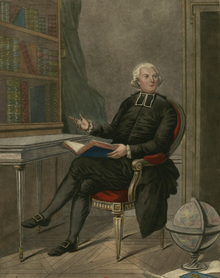Jean-Siffrein Maury
Jean-Siffrein Cardinal Maury (born June 26, 1746 in Valréas ( Département Vaucluse , formerly Comtat Venaissin ), † May 11, 1817 in Rome ) was an opponent of the French Revolution , the 1794 by Pope Pius VI. was appointed Bishop of Montefiascone and Cardinal . He switched to Napoleon's side in 1806 and was appointed Archbishop of Paris by him in 1810 .
Life
He came from the family of a shoemaker that after the lifting of the Edict of Nantes which Protestantism renounced and the Roman Catholic Church turned. The eloquent young man studied theology at the Saint-Charles seminary in Avignon and went to Paris in 1765, where he wrote his brilliantly written obituaries for the Dauphin Louis Ferdinand († December 20, 1765) and the former Polish King Stanislaus Leszczynski († February 23, 1766) earned first merits. He was ordained a priest in 1769 and was appointed vicar general of the diocese of Lombez in Gascony in 1771 . Became known Jean-Siffrein Maury mainly due to its witty speeches he about famous personalities before française Académie held, such as the 1772 in the Louvre put forward eulogy to the French King Louis the Saints , giving it a lot of applause from the audience and the benefice of an abbey brought in. In 1785 the Abbé was accepted into the Académie française and in the spring of 1789 the clergy of the Péronne electoral district elected him as a member of the Estates General .
Maury opposed the unification of the three estates in the National Assembly in vain. With Jacques Antoine Marie de Cazalès (1758-1805) and André Boniface Louis Riquetti de Mirabeau (1754-1792), Mirabeau's younger brother , he was one of the counter-revolutionary “blacks” in the Constituent Assembly . The brilliant speaker and supporter of enlightened absolutism stood up for the privileges of the crown, the clergy and the nobility and advocated the preservation of the social hierarchy of the ancien régime . Furthermore, the consistent advocate of the kingship Louis XVI. the civil constitution of the clergy and the sale of national goods.
After the ratification of the constitution of September 3, 1791, Jean-Siffrein Maury emigrated via Brussels to Koblenz, where he joined the royalists. The abbé, loyal to the king, went to Rome in early 1792, where he worked for the interests of Count de Provence, later Louis XVIII. , entered. Pope Pius VI appointed Maury titular bishop of Nicaea in April 1792 and then sent him to Frankfurt am Main as representative of the Holy See for the imperial coronation of Francis II . In 1794, the papal legate was appointed bishop of Montefiascone, as well as his elevation to cardinalate and the bestowal of the titular church of Santissima Trinità al Monte Pincio . After the capture of Rome by French troops (1798), Cardinal Maury had to flee to Saint Petersburg via Venice. However, in 1799 he returned to Italy with the power of the French Bourbons, where he participated in Venice in the conclave 1799-1800 , from which Pius VII emerged as the new Pope. Then Maury lived again in Rome.
After the church anointing and coronation of Napoleon on December 2, 1804, Cardinal Maury recognized Napoleon's regime. In 1806 the Count de Provence appointed Maury as ambassador of his court to the Vatican. However, the cardinal renounced this honor and returned to France in the same year. He moved to Napoleon's political camp and helped Napoleon with his divorce from Joséphine in 1809 . In return, the Emperor appointed Maury administrator of the Archdiocese of Paris in 1808 and elevated him - despite the opposition of Pope Pius VII - two years later to Archbishop of Paris.
As a result of the restoration of the Bourbon rule (1814), Cardinal Maury had to leave France. He went back to Rome, where Pope Pius VII had him incarcerated in Castel Sant'Angelo for six months . After the forced renunciation of the diocese of Montefiascone, Jean-Siffrein Maury spent his last days as a sick and broken man in the Roman monastery of San Silvestro. There he died on May 11, 1817.
literature
- Bernd Jeschonnek: Revolution in France 1789–1799. A lexicon. Akademie-Verlag, Berlin 1989, ISBN 3-05-000801-6 .
- Walter Markov : Napoleon and his time - history and culture of the Grand Empire. 2nd abridged and revised edition. Edition Leipzig, 1996, ISBN 3-361-00450-0 .
Web links
- Works by and about Jean-Siffrein Maury in the German Digital Library
- Maury, Jean-Siffrein. In: Salvador Miranda : The Cardinals of the Holy Roman Church. ( Florida International University website), accessed March 22, 2017.
- Entry on Jean-Siffrein Maury on catholic-hierarchy.org ; accessed on March 22, 2017.
- Short biography and list of works of the Académie française (French)
| predecessor | Office | successor |
|---|---|---|
| Jean-Baptiste de Belloy |
Archbishop of Paris 1810–1814 |
Alexandre Angélique de Talleyrand-Périgord |
| personal data | |
|---|---|
| SURNAME | Maury, Jean-Siffrein |
| ALTERNATIVE NAMES | Maury, Jean-Sifrein |
| BRIEF DESCRIPTION | cardinal |
| DATE OF BIRTH | June 26, 1746 |
| PLACE OF BIRTH | Valréas , ( Vaucluse department ) |
| DATE OF DEATH | May 11, 1817 |
| Place of death | Rome |
